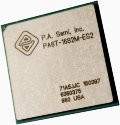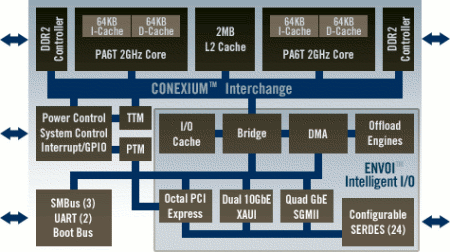Apple acquires Linux-friendly chip vendor
Apr 24, 2008 — by LinuxDevices Staff — from the LinuxDevices Archive — views A vendor of power-efficient multicore PowerPC processors that run Linux and other embedded OSes will be acquired by Apple. Its purchase of P.A. Semi could signal Apple plans to migrate its desktops, servers, and embedded consumer products back to PowerPC.
A vendor of power-efficient multicore PowerPC processors that run Linux and other embedded OSes will be acquired by Apple. Its purchase of P.A. Semi could signal Apple plans to migrate its desktops, servers, and embedded consumer products back to PowerPC.
P.A. Semi emerged from Stealth mode in late 2005, when it unveiled its ultra-low-power “PA6T” micro-architecture. A little over a year later, it began sampling its first product, the Linux-friendly PWRficient PA6t-1682M. Equipped with dual PA6T cores clocked at 2GHz apiece, the chip had a TDP (thermal design power) of 25 Watts — roughly 3-4 times lower than other similarly equipped processors fabricated on 65 nanometer technology, the company claimed.

PA6T-1682M architecture diagram
 P.A. Semi is led by Dan Dobberpuhl (pictured at right), a former VP of broadband processors at Broadcom, and a 20-year veteran of DEC's Alpha chip design team. Doberpuhl also led development of StrongARM and SiByte processors, PA says.
P.A. Semi is led by Dan Dobberpuhl (pictured at right), a former VP of broadband processors at Broadcom, and a 20-year veteran of DEC's Alpha chip design team. Doberpuhl also led development of StrongARM and SiByte processors, PA says.
According to P.A., the PA6T-1682M was alpha-tested by 10 development partners. Additionally, the chip attracted 100 initial customers, the company claims, citing Curtiss-Wright, Extreme Engineering Solutions (X-ES), Mercury Computer Systems, Performance Technologies, Splitted-Desktop Systems, and Themis Computer.
An ATX development board available for the chip runs Linux, QNX Neutrino, and VxWorks, with “other standard OS support to be announced soon,” P.A. said at the time. Wind River's Workbench hardware and software tools support the chip under both Linux and VxWorks, according to P.A. Further details can be found in our earlier coverage, here.
News of the deal with Apple was first broken by Forbes, in a story available here. It suggests Apple may use P.A. Semi chips in next-generation iPhones.
This article was originally published on LinuxDevices.com and has been donated to the open source community by QuinStreet Inc. Please visit LinuxToday.com for up-to-date news and articles about Linux and open source.